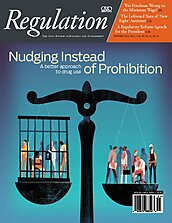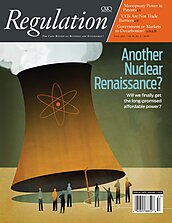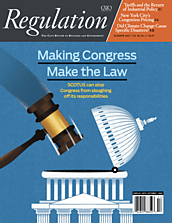From the Cover
Reinvigorating the Paperwork Reduction Act
The 1980 legislation may not have achieved all its framers hoped, but it can be revised and improved for the 21st century.
Public–Private Partnerships: Some Lessons After 30 Years
The savings policymakers usually claim for these projects are illusory, but well-designed contracts can deliver public benefits.
Too Much Information
Investors and corporations could benefit from less frequent reporting.
The Evergreening Myth
Claims that drug innovators extend their patents obscure a radical policy-making goal.
Features
Important Questions and Out-of-the-Ordinary Answers
Alberto Alesina, 1957–2020
Briefly Noted
The Housing Construction Morass
The depth and length of the decline in housing construction in the last dozen years cannot merely be attributed to a snap‐back to conditions prior to the housing investment bubble in the early 2000s or a dissipation of residential construction overhang.
OSHA Shaming and the Rule of Law
In a civilized society, however, we don’t let policemen decide whom to punish, no matter how effective that might be.
Facilitating Interstate Telemedicine
In the wake of COVID-19, 18 states have waived restrictions on the cross‐state practice of telemedicine.
Eliminating Rebates in Medicare Part D Will Not Reduce Drug Prices
The Trump administration believes PBMs are unnecessary and costly middlemen between pharmaceutical companies and consumers. This belief reflects a common fallacy and risks doing more harm than good to consumers and the public fisc.
Instead of PPP, How About a Credit Lifeline?
Assuming that it is a proper role of the federal government to help firms survive during the pandemic, there is a better way to achieve that goal.
The Consistency of EPA Benefit–Cost Analysis
Less‐than‐rigorous benefit–cost analysis can occur in administrations distracted by other exigencies as well…
In Review
Ultimate Price
For some reason, benefit–cost analysis is still a controversial topic on Capitol Hill and in some regulatory circles.
George Stigler
Power After Carbon
No matter how much we want to believe markets are the best way to proceed, we do need to take real-world evidence into account.
Deaths of Despair
To understand what is behind the increase in the death rate, the authors look at state data and note that death rates increased in all but six states.
The Decline and Rise of Democracy
Democracy is valuable only as an institutional constraint — that is, if it serves to build and maintain a limited state allowing a wide margin of individual liberty.
The Ethical Algorithm
The placement of “ethical” in the book’s title makes sense because one of the themes that arises throughout the book is the consideration of the privacy, fairness, and other ethical issues that occur in the development and application of algorithms.
Public Choice Analyses of American Economic History, vols. 1–3
More
Social institutions can encourage or discourage human ingenuity. The more economic freedom and private property rights, the more inventions and innovations.
The Third Pillar
Rajan takes on Milton Friedman’s view that the only purpose of a corporation should be to maximize profits.
Charter Schools and Their Enemies
Charter schools are not the “magic bullet” solution to the nation’s educational ills, but they deliver much better outcomes at a lower cost than traditional public schools
Working Papers
A summary of recent papers that may be of interest to Regulation’s readers.




